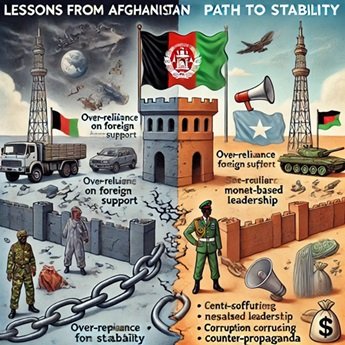By Mohamed Mukhtar
The collapse of the Afghan National Defense and Security Forces (ANDSF) in 2021 offers crucial lessons for Somalia as it transitions from relying on external military support to taking full responsibility for its national security. Afghanistan’s experience highlights the dangers of over-reliance on foreign military forces, political interference in security institutions, corruption, and weak institutional capacity.
Somalia, which has depended on the African Union Transition Mission in Somalia (ATMIS) for security, is now undergoing a critical shift as the United Nations Security Council recently endorsed the transition from ATMIS to the African Union Support and Stabilisation Mission in Somalia (AUSSOM). Somalia risks a similar security collapse without proper planning and political and financial support. This article explores key lessons from Afghanistan and their implications for Somalia’s security transition.
The Danger of Over-Reliance on Foreign Military Support
A significant factor in the ANDSF’s collapse was its dependence on U.S. military support, particularly airstrikes, intelligence, and logistics. When the U.S. withdrew its troops and ceased air support, Afghan forces quickly lost the ability to fight effectively. Somalia faces a comparable risk as its security forces have heavily relied on ATMIS and U.S. and Turkish drone strikes against Al-Shabaab.
Somali forces may struggle to control reclaimed territories without foreign air and logistical support. Somalia should strengthen its military capabilities, intelligence gathering, and supply chain management to mitigate this risk. The government must also ensure that AUSSOM provides effective transitional support while gradually reducing reliance on international partners.
Political Interference and Weak Leadership in Security Institutions
Afghanistan’s security collapse was exacerbated by political interference. Former President Ashraf Ghani frequently changed security leadership based on personal loyalty rather than professional merit, weakening the ANDSF’s operational effectiveness. Somalia has faced similar challenges, with appointments in the security sector often influenced by clan-based political considerations rather than meritocracy. This practice undermines morale, disrupts command structures, and weakens the effectiveness of security institutions.
To avoid this, Somalia must prioritize merit-based promotions, ensure stability in security leadership, and reduce political interference in military affairs. A professional and independent security force is essential for long-term stability and resilience against threats like Al-Shabaab.
Institutional Weakness, Corruption, and Ghost Soldiers
Corruption played a significant role in the ANDSF’s collapse. The presence of “ghost soldiers”—listed on payrolls but not serving—led to wasted funds, logistical failures, and declining morale. Many Afghan units lacked essential supplies such as ammunition, food, and even salaries.
Somalia has struggled with similar corruption issues within its security institutions. Addressing these issues requires establishing strict oversight mechanisms, implementing transparent payroll systems, and ensuring soldiers receive their salaries and provisions on time. Strengthening financial accountability will prevent the erosion of trust within the security sector and improve operational efficiency.
Psychological Warfare and Media Influence
The Taliban effectively used psychological warfare and media manipulation to weaken the ANDSF’s morale. By rapidly broadcasting their advances and promoting narratives of inevitable victory, they created a sense of defeat among Afghan forces even before actual battles occurred.
Al-Shabaab has adopted similar tactics in Somalia, using propaganda to spread fear, undermine government credibility, and influence public perception. To counter this, Somalia must invest in strategic communication efforts that promote government legitimacy and reinforce confidence in security forces. Strengthening the state’s narrative through media campaigns and counter-propaganda strategies will be essential in neutralizing Al-Shabaab’s influence.
Building Self-Sufficient Security Institutions

One of the biggest lessons from Afghanistan is that long-term security cannot be built on external dependency. The U.S. designed the ANDSF with advanced weaponry and operational systems but without sustainable local capabilities. When external support was withdrawn, the ANDSF collapsed because it lacked the training and logistical capacity to function independently.
Somalia must avoid this pitfall by investing in locally-led military training programs, ensuring its security forces have independent logistical capacity, and gradually developing its own air and intelligence capabilities. Long-term stability requires Somalia to build a professional, self-sustaining security force that is not overly dependent on foreign troops or funding.
Conclusion
Somalia’s transition from ATMIS to AUSSOM presents both an opportunity and a challenge. If the country fails to address its reliance on foreign forces, political interference in security institutions, corruption, and weak institutional capacity, it risks facing a security collapse similar to Afghanistan’s. The lessons from Afghanistan highlight the need for Somalia to prioritize sustainable security sector reforms, strengthen governance, and ensure a professional security force capable of maintaining stability. With careful planning and a commitment to institutional development, Somalia can successfully navigate its security transition and avoid the pitfalls that led to Afghanistan’s collapse.
Mohamed Mukhtar Ibrahim
Email: mohamed323@hotmail.com
—————————
Mohamed Mukhtar is a former minister of petroleum and minerals in Somalia.
Note
This article utilizes the 2023 Special Inspector General for Afghanistan Reconstruction report, Why the Afghan Security Forces Collapsed, as a key source to provide deeper analysis and context on the factors contributing to the collapse of the Afghan security forces.

Leave a Reply